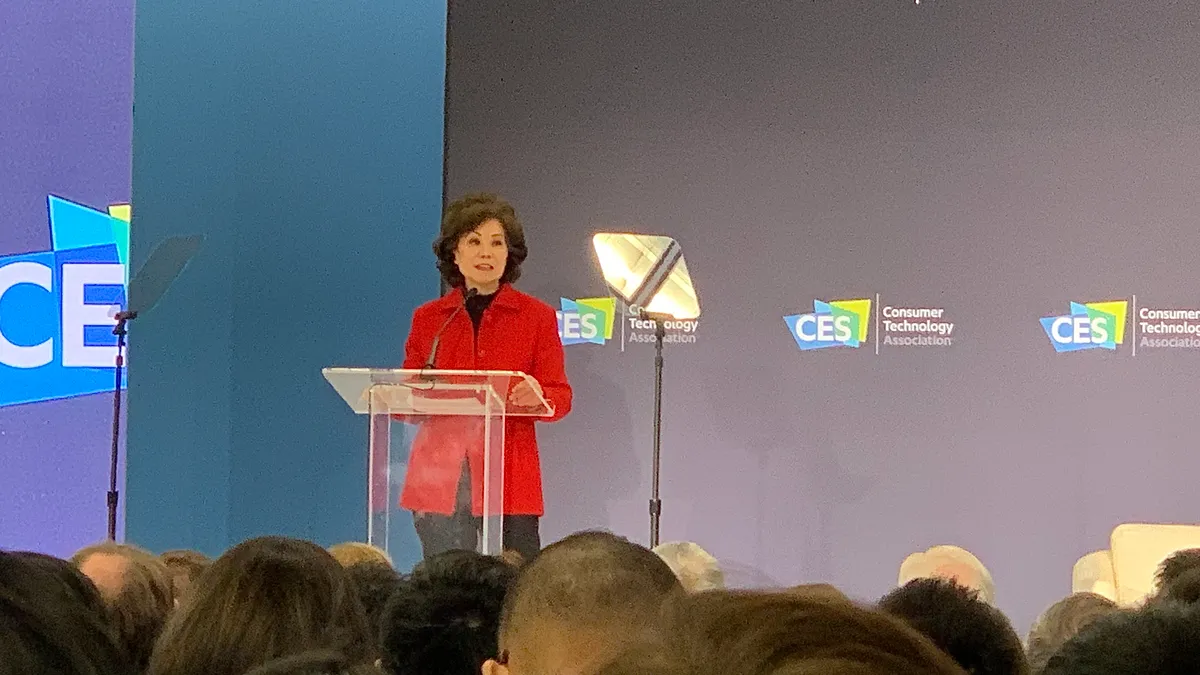Dive Brief:
- U.S. Department of Transportation (USDOT) Secretary Elaine Chao unveiled the department's newest autonomous vehicle (AV) guidelines, "Ensuring American Leadership in Automated Vehicle Technologies: Autonomous Vehicles 4.0," or AV 4.0, during a keynote speech at CES on Wednesday.
- AV 4.0 defines three principles that the federal government will recognize when developing AV technologies:
- Protect users and communities: Prioritize safety; emphasize security and cybersecurity; ensure privacy and data security; and enhance mobility and accessibility.
- Promote efficient markets: Remain technology neutral; protect American innovation and creativity; and modernize regulations.
- Facilitate coordinated efforts: Promote consistent standards and policies; ensure a consistent federal approach; and improve transportation system-level effects.
- The guidelines are intended to unify efforts across 38 federal departments and agencies that are working to advance safe AV deployment. Stakeholders and the public will be invited to comment on AV 4.0 once it is published on the Federal Register.
Dive Insight:
This report follows the September 2017 release of "Automated Driving Systems 2.0: A Vision for Safety" (ADS 2.0) and the October 2018 release of "Preparing for the Future of Transportation: Automated Vehicles 3.0" (AV 3.0), which both offered innovation guidance to industry and state and local governments. AV 4.0 builds on these last iterations, with a focus on collaboration and an emphasis on maintaining global leadership — particularly in the private sector — in the race to deploy advanced driving systems.
"Automated vehicles will someday advance traffic safety as they transform surface transportation," Chao said on stage Wednesday. "Automated vehicles have the potential to save thousands of lives annually and improve the quality of life through reduction of traffic congestion, increased productivity and environmental benefits as well."
Chao's keynote follows criticism from the National Transportation Safety Board (NTSB), National League of Cities and other agencies that have found the USDOT's safety guidance and federal legislation around AVs to be lackluster. In November 2019, NTSB said an "inadequate safety culture" was to blame for a fatal 2018 crash involving an Uber AV and a pedestrian in Tempe, AZ.
Chao, however, said safety remains a top priority for USDOT. "The landscape for AV innovation is complex and evolving, but the goals are pretty simple," she said. "They need to improve safety, security and quality of life for all Americans. That's the barometer for success."
While she touted data from the National Safety Council (NSC), which found vehicle fatalities dropped 1% from 2017 to 2018, and about 3% in the first six months of 2019, NSC says the United States is still seeing around 40,000 vehicle fatalities a year.
The AV 4.0 report says USDOT will establish manufacturing, performance and operational standards to increase safety in AV testing and integration. However, the exact parameters of these standards remain unclear.
Outside of safety, Chao highlighted the many advancements in transportation technology that are to shape the private sector in years to come, but warned, "It should not be the role of the federal government to pick winners and losers."
While the USDOT has shown support of emerging technologies — and even established the Non-Traditional and Emerging Transportation Technology Council (NETT) in March 2019 — the department says it will remain technology neutral to allow the public "to choose the most economically efficient and effective transportation and mobility solutions."
These emerging mobility technologies are also beginning to infiltrate the commercial space travel market. Chao said the U.S. is now No. 1 in commercial space launches — 34 U.S. launches and re-entries occurred in 2019 — and USDOT is "streamlining launch and re-entry licensing processes to enable further growth in the commercial space sector." USDOT also recently opened an Office of Spaceports.












